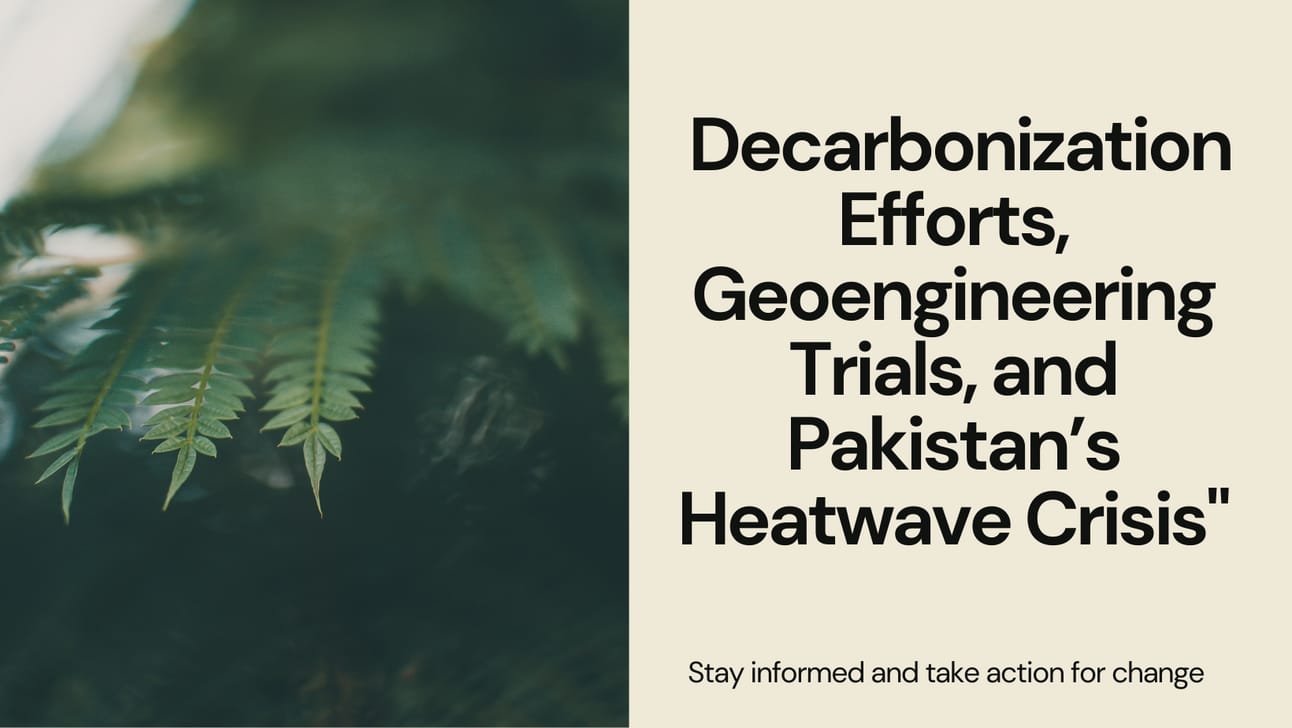- ClimaTea
- Posts
- Global Climate Pulse: Decarbonization Efforts, Geoengineering Trials, and Pakistan’s Heatwave Crisis"
Global Climate Pulse: Decarbonization Efforts, Geoengineering Trials, and Pakistan’s Heatwave Crisis"
India’s green steel push, Japan’s emissions drop, and the UK’s geoengineering experiments lead global sustainability efforts, while Pakistan grapples with severe heat and dwindling snow packs.

Good Evening,
India is taking steps to decarbonize its industry, with new green steel mandates supporting its goal of net-zero emissions by 2070. Japan has successfully reduced its greenhouse gas emissions by 4%, thanks to a mix of renewables and nuclear power. Meanwhile, the UK is launching geoengineering experiments to explore potential climate-cooling technologies. In Pakistan, a historic snowpack decline is threatening water supplies, while a severe heatwave grips the country, causing widespread concern.
🌍Global Climate Watch
India (Clean Industry)
India is moving to decarbonize industry. In late April the federal steel secretary announced incentives to spur “green steel” production (low-carbon steel using renewables) and even a mandate to require green steel in state-funded projects. This builds on India’s new green-steel policy and aligns with its goal of net-zero emissions by 2070 reuters.com.
Japan (Emissions)
Japan reported a 4% decline in greenhouse gas emissions for FY2023/24 (to 1.071 billion tonnes), the lowest on record. This was achieved through lower energy consumption, a rising share of renewables (now ~22.9% of power) and the gradual restart of nuclear reactors reuters.com.
Geoengineering Experiments Initiated
UK scientists, supported by £50 million from the government-funded Advanced Research and Invention Agency (ARIA), are initiating small-scale outdoor geoengineering experiments to collect crucial data on strategies to temporarily cool the planet. These experiments aim to test solar radiation management technologies, such as cloud brightening or releasing reflective particles into the atmosphere. The Guardian
Pakistan Climate Watch
Declining Snowpack Threatens Water Supply:
Snowfall in the Himalayas has reached its lowest level in 23 years, jeopardizing the water supply for approximately two billion people across Asia. The decline in snowpack is exacerbating early summer water stress, reducing river flows, and straining agriculture and hydropower. New York Post
Severe Heatwave Conditions:
Pakistan is experiencing a prolonged heatwave, with temperatures expected to remain 5–7°C above normal in southern Sindh, southern Punjab, and Balochistan. The National Disaster Management Authority (NDMA) anticipates isolated rain in northern, central, and southern regions from May 1 to May 7, which may alleviate the heatwave conditions.
📊 🌍 Climate Myth vs. Fact
Myth: “The Earth’s climate is always changing naturally, so current warming isn’t a concern.”
Fact: While the Earth's climate has indeed changed over geological time scales, the current rate of warming is unprecedented and primarily driven by human activities. Since the Industrial Revolution, the burning of fossil fuels has significantly increased the concentration of greenhouse gases in the atmosphere, leading to rapid global temperature rise. This accelerated warming poses serious risks to ecosystems, weather patterns, and human societies.
What innovative climate solutions have you encountered recently? Share your thoughts and ideas with us!
💬 Comment Corner